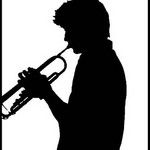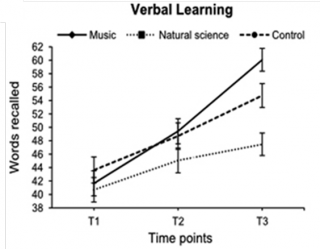Memory
Musical Training Boosts Verbal Memory
Learning to play the saxophone could increase the size of the auditory cortex.
Posted January 23, 2013

Before cutting any more of the arts curriculum from schools, take a look at the results of a study that came out this month in Frontiers in Neuroscience. Kids who took music lessons developed better memories for words than kids who took an extra science class or had no extra lessons.
This study followed 73 seven-year olds in Germany for a year and a half, starting at the beginning of second grade. 25 were placed in a weekly 45-minute class that taught the kids how to play an instrument, another 25 spent the same amount of time in a science class and the rest received no additional instruction.
All students’ memories were tested three times, first at the beginning of second grade, before training began, and then again at the beginning and end of third grade. For visual memory, the students saw a sequence of dots on a grid and tried to remember the order they saw the dots, similar to Simon. For verbal memory, students heard a list of 15 words and tried to recall as many as they could.
The groups differed on key variables that might affect memory. The group receiving music lessons started with IQ scores about 13 points higher than the science group and 7 points higher than the control group. They were also slightly younger, just a few months past their seventh birthday, whereas the science group was almost 7 and a half. Despite the age and IQ differences, the groups were equal on verbal and visual memory tests when second grade began.
A year later, at the beginning of third grade, the groups were still equivalent in visual memory. However, the group receiving music lessons had improved their verbal memory more than the other groups. By the last test at the end of third grade, they had extended their advantage in verbal memory and now scored significantly better than the other groups. Music training seemed to cause an improvement in verbal memory that could not be explained by spending more time learning, because the music group scored higher than the science group. The improvement was specific to music lessons.

Music training has been linked to greater volume in the planum temporale, a part of the auditory cortex. Prior to this study, It was unclear if that enhanced volume was the result of music training or if people with more developed planum temporales were more likely to pick up an instrument. Although this study didn’t assess brain size, it assessed a trait—verbal memory—linked to volume of the planum temporale. The time spent focusing on melodies may lead to auditory cortex growth. These added brain cells might benefit recollection of all auditory information, like the name of someone you’ve just met at a party.
This study provides good evidence that if you want your second grader to beef up her verbal memory, you should enroll her in a violin class.
This may also explain why guys on dating sites pictured holding a guitar are three times more likely to receive flirtatious responses after messaging single ladies. If girls want a guy who can listen, who better than a musician to pay attention to her words and win her heart?
Image credit: Sarah Bjork
Study:
Roden I, Kreutz G and Bongard S (2012) Effects of a school-based instrumental music program on verbal and visual memory in primary school children: a longitudinal study. Frontiers in Auditory Cognitive Science.


